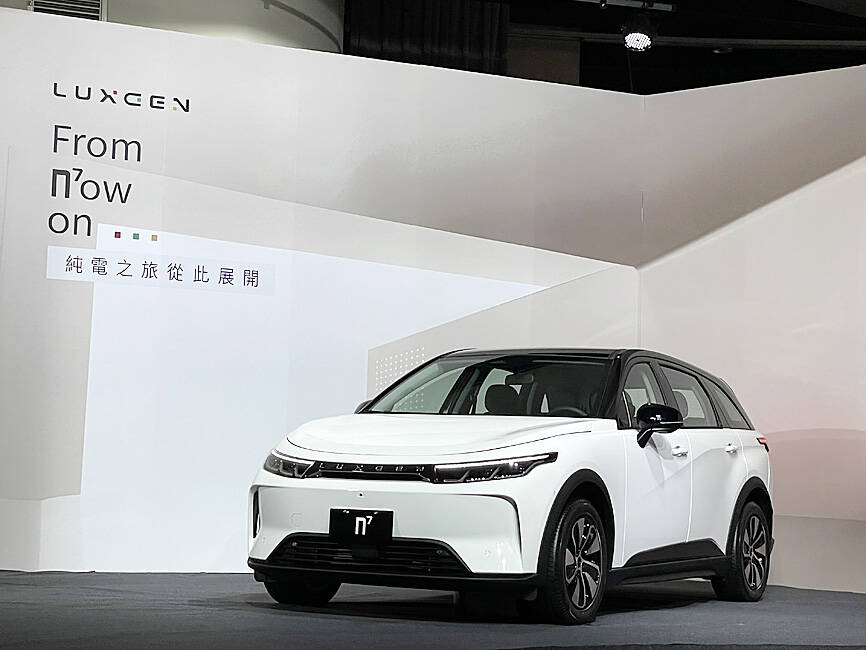Luxgen Motor Co (納智捷汽車), a subsidiary of Yulon Motor Co (裕隆汽車), yesterday said it is again offering a NT$100,000 discount for its entry-level n7 electric vehicle models.
The n7’s price has gone down from NT$1.099 million to NT$999,000, Luxgen said, adding that there are 25,000 preorders for the model.
MG Motor’s electric hatchback, the MG4, entered the market in the middle of last month, with a starting price of NT$990,000.

Photo: Amy Yang, Taipei Times
China Motor Corp (中華汽車), which distributes MG vehicles in Taiwan, said it aims to sell 1,600 MG4s this year.
MG, originally a British brand, was acquired by China’s SAIC Motor Corp (上海汽車) in 2005.
Asked about competition from MG in the entry-level electric vehicle segment, Luxgen president Jeff Lee (李應生) yesterday said he was not worried, given the difference in target consumers.
The n7 series includes multi-purpose vehicles suitable for families, while MG4 is a compact sports car, he said.
Luxgen started taking new orders for the n7 series last month, after smooth delivery at the beginning of the year, Lee said, adding that the company expects to deliver all the first preorders in the third quarter.
With the number of n7 owners increasing to more than 30,000, Luxgen said it plans to double its n7 experience centers this year from five to 10.
Luxgen had sold 1,037 n7 models last month, marking the third consecutive month of monthly sales exceeding 1,000 units, while MG4 sales reached 122 units last month, the latest data for new car sales released yesterday showed.
Toyota Motor Corp’s vehicles, distributed by Hotai Motor Co (和泰汽車) in Taiwan, remained on top, selling 9,689 units last month, down 7.7 percent month-on-month. It has a market share of 23.3 percent.
Tesla Inc outperformed its peers last month, with sales soaring 214 percent sequentially to 3,898 units, giving the US electric vehicle carmaker a 9.4 percent market share and placing second in local car rankings, data compiled by market researcher U-Car showed.
Lexus, the luxury brand of Toyota, ranked No. 3, with sales rising 5.1 percent month-on-month to 2,628 units last month. Lexus has a 6.3 percent market share.
Mercedes-Benz AG, with a 5.7 percent market share, ranked No. 4. It sold 2,376 units, down 11 percent from May.
BMW AG showed the strongest performance, with sales doubling to 2,280 units, boosted by record-high electric vehicle sales of 984 units last month. BMW has a 5.5 percent market share.
Overall, Taiwan’s new car sales last month edged up 0.3 percent to 41,587 units from May, fueled by strong electric vehicle growth, U-Car data showed.
That brought total new car sales during the first half of this year to 232,503 units, down one percent from the same period of last year, it said.

Semiconductor business between Taiwan and the US is a “win-win” model for both sides given the high level of complementarity, the government said yesterday responding to tariff threats from US President Donald Trump. Home to the world’s largest contract chipmaker, Taiwan Semiconductor Manufacturing Co (TSMC, 台積電), Taiwan is a key link in the global technology supply chain for companies such as Apple Inc and Nvidia Corp. Trump said on Monday he plans to impose tariffs on imported chips, pharmaceuticals and steel in an effort to get the producers to make them in the US. “Taiwan and the US semiconductor and other technology industries

A start-up in Mexico is trying to help get a handle on one coastal city’s plastic waste problem by converting it into gasoline, diesel and other fuels. With less than 10 percent of the world’s plastics being recycled, Petgas’ idea is that rather than letting discarded plastic become waste, it can become productive again as fuel. Petgas developed a machine in the port city of Boca del Rio that uses pyrolysis, a thermodynamic process that heats plastics in the absence of oxygen, breaking it down to produce gasoline, diesel, kerosene, paraffin and coke. Petgas chief technology officer Carlos Parraguirre Diaz said that in

SMALL AND EFFICIENT: The Chinese AI app’s initial success has spurred worries in the US that its tech giants’ massive AI spending needs re-evaluation, a market strategist said Chinese artificial intelligence (AI) start-up DeepSeek’s (深度求索) eponymous AI assistant rocketed to the top of Apple Inc’s iPhone download charts, stirring doubts in Silicon Valley about the strength of the US’ technological dominance. The app’s underlying AI model is widely seen as competitive with OpenAI and Meta Platforms Inc’s latest. Its claim that it cost much less to train and develop triggered share moves across Asia’s supply chain. Chinese tech firms linked to DeepSeek, such as Iflytek Co (科大訊飛), surged yesterday, while chipmaking tool makers like Advantest Corp slumped on the potential threat to demand for Nvidia Corp’s AI accelerators. US stock

SUBSIDIES: The nominee for commerce secretary indicated the Trump administration wants to put its stamp on the plan, but not unravel it entirely US President Donald Trump’s pick to lead the agency in charge of a US$52 billion semiconductor subsidy program declined to give it unqualified support, raising questions about the disbursement of funds to companies like Intel Corp and Taiwan Semiconductor Manufacturing Co (台積電). “I can’t say that I can honor something I haven’t read,” Howard Lutnick, Trump’s nominee for commerce secretary, said of the binding CHIPS and Science Act awards in a confirmation hearing on Wednesday. “To the extent monies have been disbursed, I would commit to rigorously enforcing documents that have been signed by those companies to make sure we get